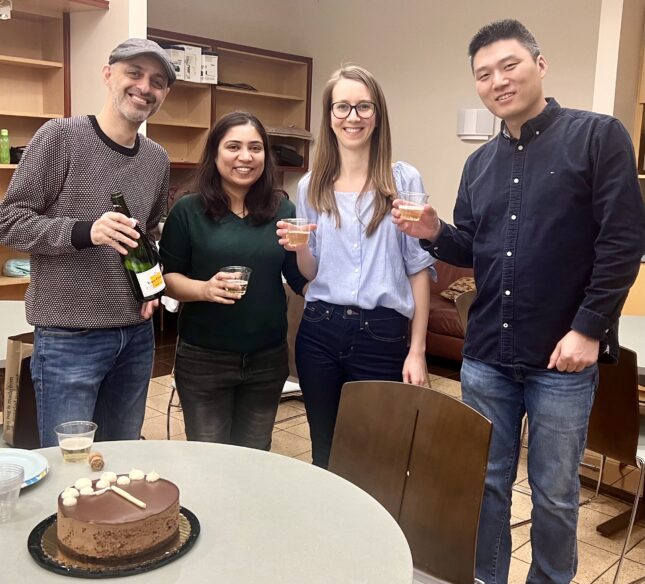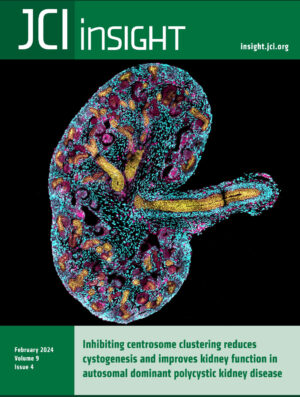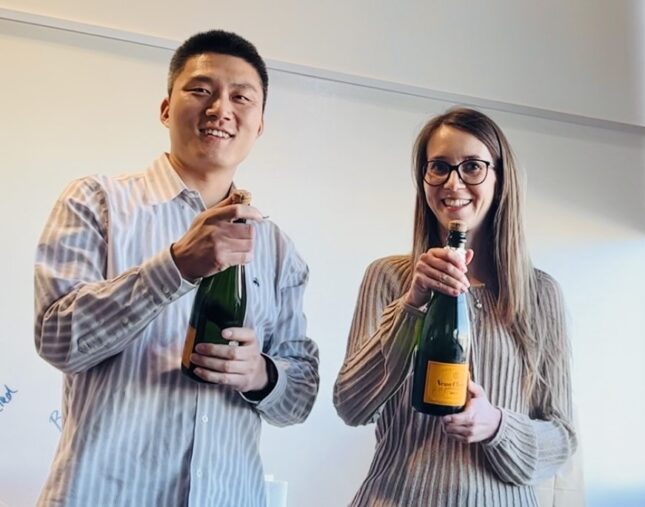
Congratulations to the research team of the Mahjoub Laboratory, who are celebrating their multiple recent publications, one of which landed the cover of the journal JCI Insight.
The WashU Nephrology laboratory, headed by Moe Mahjoub, PhD, focuses on defining the roles of centrosome-cilium complex during kidney development and homeostasis. These signaling hubs regulate key aspects of cell division, differentiation, and fate. Defects in the structure or function of these organelles lead to a range of human diseases known collectively as “ciliopathies,” which include polycystic and fibrotic kidney diseases, among others.
“We’re really interested in understanding what happens to kidney cells when there is a mutation that disrupts the normal functions of the centrosome. These mutations can be in different genes, and they can impact centrosome structure directly or indirectly. Either way, these mutations often end up manifesting as cystic and fibrotic kidney disease in humans, and we’re trying to figure out how to stop the development and progression of these diseases.”
Moe Mahjoub
The lab’s most recent publication is “Inhibiting centrosome clustering reduces cystogenesis and improves kidney function in autosomal dominant polycystic kidney disease (ADPKD).” The article was featured on the cover of JCI Insight (Feb 2024, vol 9, issue 4) with an image credited to postdoctoral fellow and co-author Ewa Langner, PhD. The researchers explored therapeutic strategies for ADPKD and found that inhibiting centrosome clustering using specific inhibitors reduced cyst formation, improved kidney function, and decreased interstitial fibrosis. Their approach represents a promising target for treating ADPKD. Authors: Tao Cheng, Aruljothi Mariappan, Ewa Langner, Kyuhwan Shim, Jay Gopalakrishnan, and Moe R Mahjoub.

In a second article, “Cep120 is essential for kidney stromal progenitor cell growth and differentiation,” published in EMBO Reports (Jan 2024, Vol 24, No 1), they investigated the cellular and developmental defects caused by loss of Cep120 and aberrant centrosome biogenesis in the embryonic kidney stroma. Loss of Cep120 in renal stromal progenitors disrupts centrosome biogenesis, growth and fate of interstitial cells, resulting in hypoplastic kidneys. Defective centrosome formation also sensitizes the developed kidneys, causing rapid fibrosis after injury. Authors: Ewa Langner, Tao Cheng, Eirini Kefaloyianni, Charles Gluck, Baolin Wang and Moe R Mahjoub.

In their third publication titled “Aberrant centrosome biogenesis disrupts nephron and collecting duct progenitor growth and fate resulting in fibrocystic kidney disease,” published in Development (Dec 2023; vol 150, issue 24), they investigated the impact of centrosome dysfunction on kidney development. They found that loss of the ciliopathy gene Cep120 disrupted nephron and collecting duct progenitor growth, leading to fibrocystic kidney disease. The study highlights the critical role of centrosomes in kidney morphogenesis and identifies new therapeutic targets for renal centrosomopathies. Authors: Tao Cheng, Chidera Agwu, Kyuhwan Shim, Baolin Wang, Sanjay Jain and Moe R. Mahjoub.
“These three studies represent the first comprehensive analysis of the consequences of defective centrosome biogenesis on kidney development and function. In the process of learning about the critical role of centrosomes in the kidney, we’ve been able to identify nodes in pathways that may be targeted for therapy in pathologic conditions. So far, we were able to identify such a therapeutic approach for the most common form of cystic kidney disease, ADPKD. We’re now working on testing new therapeutic targets for the rare and severe congenital cystic kidney diseases, more specifically, the renal ‘centrosomopathies.'”
Moe Mahjoub
On X, follow @MahjoubLab, @ChengTao_PKD, @LangnerEP and @WUNephrology; visit and “Like” us on Facebook.